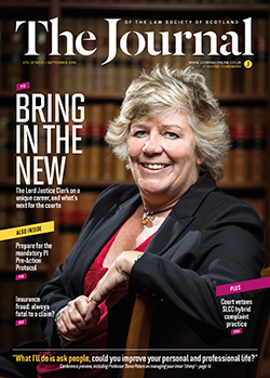Opinion: Alison Reid

Community Law Advice Network (Clan Childlaw) is a charity and law centre. It provides free, child-centred, outreach legal advice representation to the most vulnerable children in Scotland. It provides training. It also contributes towards policy development in relation to child law, and it is in this capacity that Clan intervened in the so-called “named person” case.
From before the drafting of the Children and Young People (Scotland) Bill we were engaged in discussions. We responded to several Scottish Government consultations suggesting amendments which could be made to improve the legislation, including the information sharing provisions, some of which were incorporated within the bill. However, our concern remained that the balance had shifted too far towards the sharing of information, and that as a result there was a danger that young people would not engage with confidential services and so would not obtain the support that they required.
We engaged with the Scottish Parliament, providing briefing notes for MSPs, and finally, at stage 3 of the bill, we proposed an amendment. It was not passed. Our only option then to advance our policy issue was to consider intervening in the ongoing judicial review proceedings.
An intervention is where someone with an interest in a case provides assistance to the court by adding a different perspective. We had sufficient “standing” given our clear involvement with the process up to that point, and the issue of children’s rights had not been fully explored allowing us to bring a different viewpoint.
We intervened in writing in the Inner House, and then in writing and orally in the Supreme Court. We argued that:
- the 2014 Act was imprecise in setting out the conditions for disclosure of confidential information, creating real, practical difficulties for professionals providing named person and other services; and
- the balance between sharing information amongst professionals and the ability of a young person to access confidential services had shifted too far towards the sharing of information, resulting in an unlawful interference with a child’s right to privacy as protected by article 8 of the European Convention on Human Rights. The Act set a lower threshold for sharing information about children than had previously been the case even if the child did not consent.
The Inner House did not agree with our arguments. However, the Supreme Court did, determining that the information sharing provisions were incompatible with the rights of children, young people and parents under article 8.
The court stated that the law must be formulated with sufficient precision to enable any individual to regulate their conduct, and that it must indicate with sufficient clarity the scope of any discretion of competent authorities. This had not been done. The information sharing provisions in the Act required to be read alongside the Data Protection Act 1998, and there were “very serious difficulties in accessing the relevant legal rules”.
It was also concerned that there was a lack of safeguards which would enable the proportionality of an interference with article 8 rights to be adequately examined, stating: “It is thus perfectly possible that information, including confidential information concerning a child or young person’s state of health (for example, as to contraception, pregnancy or sexually transmitted disease), could be disclosed... to a wide range of professionals without either the child or young person, or her parents being aware of the interference with their article 8 rights, and in circumstances in which there was no objectively compelling reason for the failure to ascertain and have regard to their views.”
Our intervention considered the issues from a children’s rights perspective and was rooted in the United Nations Convention on the Rights of the Child. The Supreme Court noted that our involvement had resulted in “more focus” on article 8 of the ECHR in relation to the information sharing provisions “than there had been in the debates both in the Inner House and before the Lord Ordinary”.
We would like now to work with the Scottish Government to find a solution to redress this balance and to protect a child’s right to privacy as well as to ensure that appropriate information sharing takes place. We also hope that our intervention can be viewed as a good example of how strategic or impact litigation can be used to advance policy. Perhaps this will encourage others to contemplate intervening in cases in the future.
In this issue
- Beyond the named person service
- Sexual harassment: an everyday problem
- Governing Scotland in a federal United Kingdom
- Losing our judgment? (1)
- Reading for pleasure
- Opinion: Alison Reid
- Book reviews
- Profile
- President's column
- The future, step by step
- People on the move
- Changing face of the courts
- Success: the chimp factor
- Courts reform: a call to pre-action
- Teeth that could be sharper
- Good claims, bad lies
- Unlocking doors: demystifying squatting
- Back to basics
- Brexit and IP: what should solicitors be doing now?
- Agency, insolvency and termination
- Brexit and the agricultural sector
- A carnival for some, but not for others
- Scottish Solicitors' Discipline Tribunal
- Culling of the hybrids
- Common property: what policy?
- Cause of action
- Client balances: reminder issued
- Law reform roundup
- From the Brussels office
- Paralegal pointers
- Your Law Society of Scotland Council Members
- At the doors of the court
- Ask Ash
- To the focused, the medals
- Losing our judgment?
- MacKenzie boosts Society's AML drive






